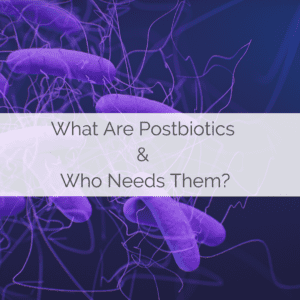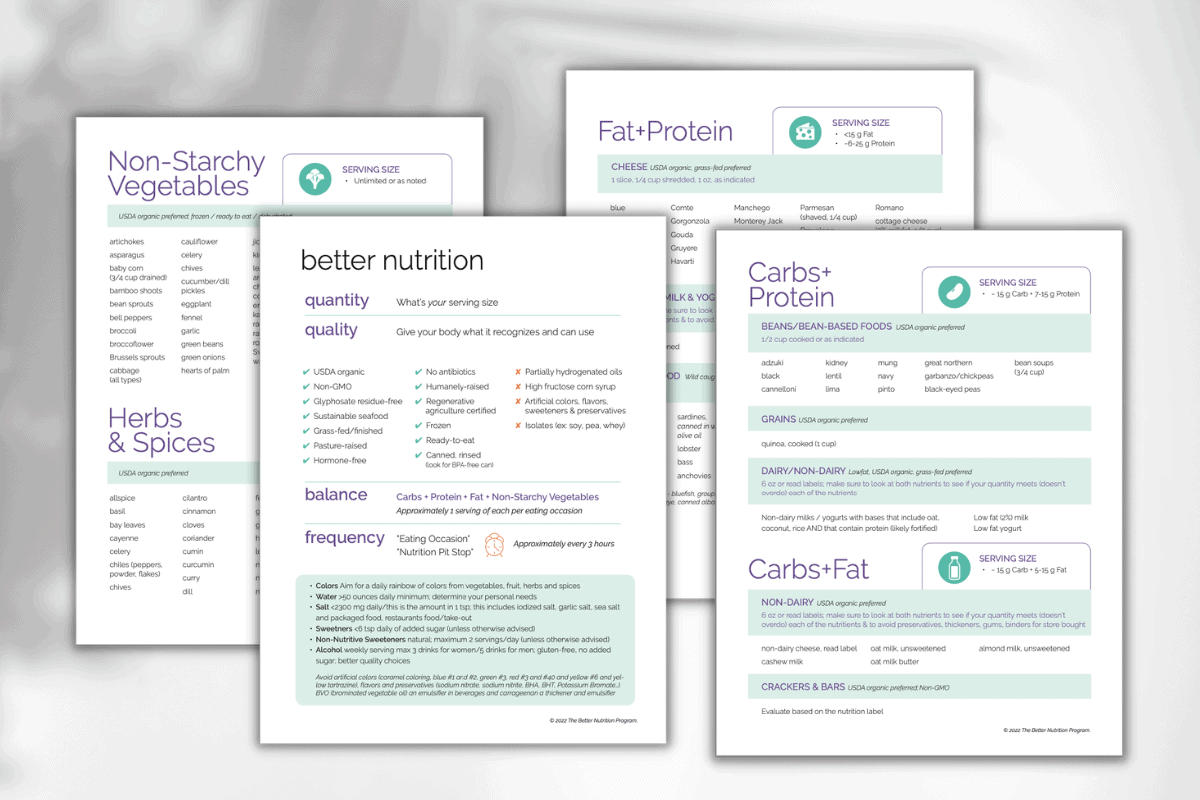Heard of postbiotics and now wondering do your patients need them? First we learned about probiotics and then prebiotics. Now, let’s review what we know about this new “biotics” to help you personalize recommendations. In this article you will learn:
- What are postbiotics?
- Who many benefit from supplemental postbiotics?
- How can you personalize postbiotic recommendations?
Probiotic and Prebiotic Overview
Inside of our digestive tract, there’s a whole entire world of bacteria that thrive within our system. They help us defend our turf against unhealthy bacteria and to break down and convert nutrients into usable forms. You’ve likely heard of these bacteria (“biotics”) known as probiotics.
In the last few decades, science has begun to discover just how important (and complex) our gut health and gut bacteria are to our system. But probiotics like lactobacillus and bifidobacteria can’t work alone. In fact, they’re part of an entire equation, which includes prebiotics and postbiotics.
The probiotics in our digestive system are living organisms, and require some form of fuel or energy to live. And this is where prebiotics come into the equation. Prebiotics, in simple terms, are the foods that fuel the probiotics. Most often, these are a form of carbohydrate based fibers known as oligosaccharides. Some foods that include these prebiotics include: asparagus, sugar beet, garlic, chicory, onion, Jerusalem artichoke, oat, wheat, honey, banana, barley, tomato, rye, soybean, human and cow’s milk, peas, beans, and seaweed. [1]
What are postbiotics?
After probiotics work their magic digesting and breaking down these materials (prebiotics) they produce the next “biotics”: postbiotics. These ‘end products’ are short chain fatty acids known as butyrate, propionate, and acetate.
Research suggests these postbiotics support optimizing gut and immune health, specifically for gut lining integrity, to combat unhealthy inflammation, support the immune system’s efforts to reduce the influence of unhealthy bacteria. Additional benefits include aiding blood sugar metabolism, lowering lipogenesis and helping optimize cholesterol.
How do Postbiotics work?
So what exactly are the benefits of these inactivated microbial cells, cell components, or metabolites? Research indicates that these postbiotics may play a role in a number of areas including our immune system and our digestive function.
We’ve known for some time now that our gut has an intimate relationship with our digestive system. We are now learning how postbiotics can play a role in supporting that relationship. For example, a known postbiotic short chain fatty acid, butyrate, has been linked to regulatory T-cell production in the digestive tract. And other postbiotic metabolites have been indicated in increasing the expression of cytokines that impart anti-inflammatory action. [4]
Postbiotics have also been investigated in their role of overall digestive function — specifically moderating symptoms of inflammatory bowel diseases such as Ulcerative Colitis and Crohn’s Disease. [4] A handful of studies have also investigated the benefit of inactivated lactobacilli and found positive results with postbiotic use for the management of chronic diarrhea or IBS-D. [3]
Should We Recommend Postbiotics?
Yes… and No… Maybe? When evaluating the use of any supplemental nutrient, we want to first evaluate someone’s total nutrition and how it delivers against their body’s current needs. Second, we would evaluate the quality and known efficacy of the supplemental ingredient (whether as a supplement or in a food as a “functional” fortification).
We absolutely want to support the formation of postbiotics in all our patients. We can do this by evaluating their intake of probiotics and prebiotics. But for some patients, we may identify through testing that this is insufficient for creating enough postbiotics to promote optimal health.
As noted earlier, there are several roles of probiotics, not just about the end product of their interaction with prebiotics. Thus, it would be a mistake to forgo addressing them and prebiotics from total nutrition (food and, as needed, supplements).
Supporting the health of our gut and immune system takes work. It takes thoughtful choices, actions, and behaviors to cultivate a digestive system that’s balanced and full of healthy bacteria. And this means looking at the bigger picture of our overall food choices: are we consuming a balance of alkaline forming foods, incorporating enough fiber, and properly hydrating. It also requires doing an audit on our behaviors and whether or not those support our gut health: are we moving enough, are we remembering to take time to focus on our breath, do we allow stress to take over?
As much as it would be wonderful to find the “magic pill” that’s going to impart all the health benefits, unfortunately it’s not that simple. Though the preliminary research does indicate that, yes, postbiotic supplementation can be health promoting in certain circumstances, we shouldn’t expect supplementing with healthy end products to entirely make up for the lack of setting up a healthy house in the first place.
A little history on postbiotics…
This topic is truly new to the world of gut health! It was around 2015 when the term postbiotics started getting off the ground in literature, and it didn’t peak until 2020. Because this is such a new area of research, there’s still so much more to discover about postbiotics, but here’s what we do know so far.
Up until 2019, there was no agreement on what exactly postbiotics were. The scientific community generally considered them to be the bioactive compounds that were produced as a byproduct of microbial fermentation. Those byproducts included many different components including metabolites, short-chain fatty acids, microbial cell fractions, functional proteins,and extracellular polysaccharides, among others [2]
In 2019 the International Scientific Association for Probiotics and Prebiotics (ISAPP) convened a panel of scientific experts to determine the definition and scope of postbiotics. The panel decided on a definition of postbiotics as “preparation of inanimate microorganisms and/or their components that confers a health benefit on the host”. The publication also notes that “effective postbiotics must contain inactivated microbial cells or cell components, with or without metabolites, that contribute to observed health benefits.” [3]
Sources:
[1] Davani-Davari D, Negahdaripour M, Karimzadeh I, et al. Prebiotics: Definition, Types, Sources, Mechanisms, and Clinical Applications. Foods. 2019;8(3):92. Published 2019 Mar 9. doi:10.3390/foods8030092. [2] Wegh CAM, Geerlings SY, Knol J, Roeselers G, Belzer C. Postbiotics and Their Potential Applications in Early Life Nutrition and Beyond. Int J Mol Sci. 2019;20(19):4673. Published 2019 Sep 20. doi:10.3390/ijms20194673 [3] Salminen, S., Collado, M.C., Endo, A. et al. The International Scientific Association of Probiotics and Prebiotics (ISAPP) consensus statement on the definition and scope of postbiotics. Nat Rev Gastroenterol Hepatol 18, 649–667 (2021). https://doi.org/10.1038/s41575-021-00440-6 [4] Ryan Ramon, MS, RD. “What are Postbiotics? A Comprehensive Overview.” Healthline. Published 19 May 2021. Accessed 28 August 2021. https://www.healthline.com/nutrition/postbiotics#health-benefits
















